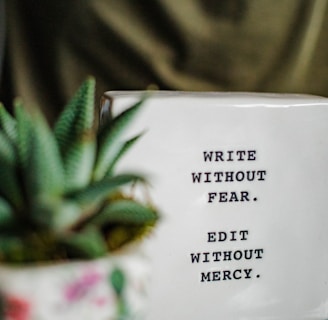
Editing
Editing is the act of altering a given word structure to improve it in various ways. That is of course when referring to something that has word structure. You can edit a movie, a painting, an image, etc. Which we do edit images here as well, but our focus is, obviously, word structures. Books, blogs, periodicals, and so on. And that is why you are reading this page.
Most often when it comes to editing, we tend to think about the cost more than the long term. This often is what sets a best seller apart from a "rag" that never gets beyond your uncles bathroom.
You want your book to be, first and foremost, legible enough to read. We have come across books in the past that are so bad it is impossible to get past the first page. It actually hurts your eyes to try and read it since the whole of it (syntax, grammar, sentence structure, font choice, formatting and so on) is so wrong! This is a prime example of why every book needs an editor that is not the author.
While we see the need for and the clear benefits of "self-publishing" in the format that it is today (on-demand print) there has also been a critical issue rise because of it. The thought process of "I can print, so I will".


Regardless of talent or editing, many of the self published books on the market now are nothing but fire tender. This has led to another problem whereby when a person sees a "self-published" book, it is automatically thought to be trash. A large percentage of self published authors are quite good and meticulous at the work they do. Success is not always a thing for many who should be successful because of these issues.
Should you use and editor? A resounding YES!
Is there an alternative? NO!
There's an old saying that says a man who is his own lawyer has a fool for an attorney. The same goes for editing. That isn't meant to try to get your business, it's just a reality. In truth, we've even seen books that were copiously charged for edit that still had bad editing. So while there is no room for doubt on whether you need an editor, be cautious on the ones you choose.
There are many variables when it comes to editing. The first is finding someone who knows their stuff. Our top editor has worked on many projects. Including novels, teaching books, legal papers, and more. You are in good hands with us.
Some of those variables are methods of how to pay for the editing services. And if you're like us, this is the part you likely scanned down to. Get to the point!


We take each client one at a time and each project will be given equal credence and consideration. This is how we charge:
1. Word Count Option 1 - Per word ($.03 - $.05) determined by the over all amount of the words. The more the words in the project, the cheaper per word it is.
2. Word Count Option 2 - Per hour ($40 - $50), also determined by the overall word count.
3. Word Count Option 3 - Per page ($10-$12). Again determined by the overall word count.
4. Flat Fee - A quote is given for the entire project. This will generally be done when the entire publishing project is being done. This is the only option for ghost writing. If it is not a ghost written project, this option may still be used if we are doing more than just editing. I.E. formatting, cover design, market, etc.
5. Contract - This option only applies to ongoing, repetitive work. Such as blog editing, newsletters, social media posting, etc.
If this doesn't fit what you are needing, please don't hesitate to contact us here. There may still be something that we can work with you on!


